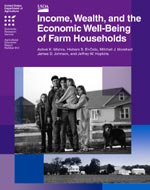Income, Wealth, and the Economic Well-Being of Farm Households
- by Ashok K. Mishra, Hisham S. El-Osta, Mitch Morehart, James Johnson and Jeffrey W. Hopkins
- 7/1/2002
Overview
Agricultural policy is rooted in the 1930's notion that providing transfers of money to the farm sector translates into increased economic well-being of farm families. This report shows that neither change in income for the farm sector nor for any particular group of farm business can be presumed to reflect changes confronting farm households. Farm households draw income from various sources, including off-farm work, other businesses operated and, increasingly, nonfarm investments. Likewise, focus on a single indicator of well-being, such as income, overlooks other indicators such as the wealth held by the household and the level of consumption expenditures for health care, food, housing, and other items. Using an expanded definition of economic well-being, we show that farm households as a whole are better off than the average U.S. household, but that 6 percent remain economically disadvantaged.
Download
-
Entire report
Download PDF -
Table of Contents
Download PDF -
Frontmatter
Download PDF -
Executive Summary
Download PDF -
Introduction
Download PDF -
Income and Well-Being of Farm Households
Download PDF -
Composition of Farm Household Income and Wealth
Download PDF -
Farm Household Heterogeneity
Download PDF -
Variability in Farm Household Income and Wealth
Download PDF -
Farm and Nonfarm Household Comparability
Download PDF -
Findings and Policy Implications
Download PDF -
Appendix A
Download PDF -
References
Download PDF


